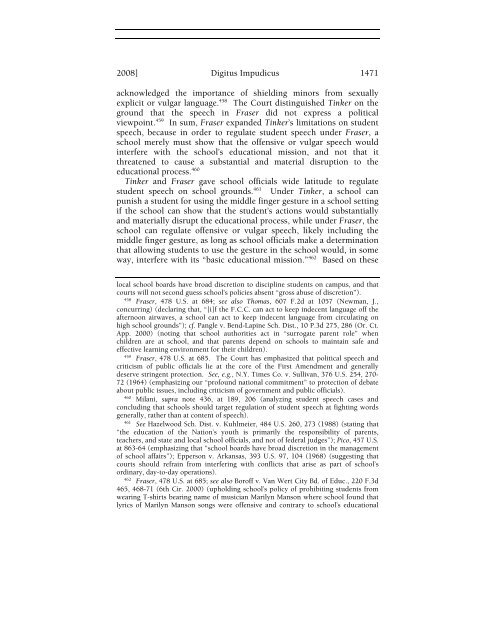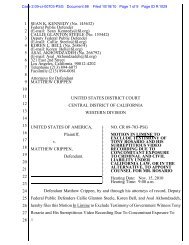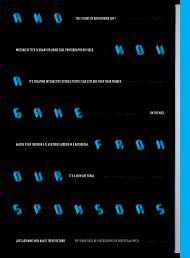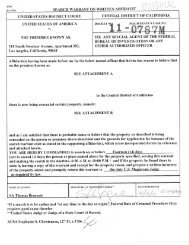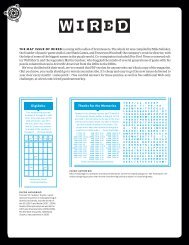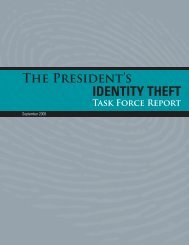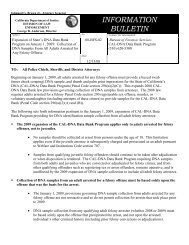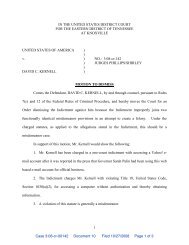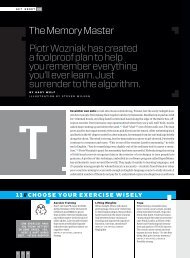Digitus Impudicus: The Middle Finger and the Law - Wired
Digitus Impudicus: The Middle Finger and the Law - Wired
Digitus Impudicus: The Middle Finger and the Law - Wired
Create successful ePaper yourself
Turn your PDF publications into a flip-book with our unique Google optimized e-Paper software.
2008] <strong>Digitus</strong> <strong>Impudicus</strong> 1471<br />
acknowledged <strong>the</strong> importance of shielding minors from sexually<br />
explicit or vulgar language. 458 <strong>The</strong> Court distinguished Tinker on <strong>the</strong><br />
ground that <strong>the</strong> speech in Fraser did not express a political<br />
viewpoint. 459 In sum, Fraser exp<strong>and</strong>ed Tinker’s limitations on student<br />
speech, because in order to regulate student speech under Fraser, a<br />
school merely must show that <strong>the</strong> offensive or vulgar speech would<br />
interfere with <strong>the</strong> school’s educational mission, <strong>and</strong> not that it<br />
threatened to cause a substantial <strong>and</strong> material disruption to <strong>the</strong><br />
educational process. 460<br />
Tinker <strong>and</strong> Fraser gave school officials wide latitude to regulate<br />
student speech on school grounds. 461 Under Tinker, a school can<br />
punish a student for using <strong>the</strong> middle finger gesture in a school setting<br />
if <strong>the</strong> school can show that <strong>the</strong> student’s actions would substantially<br />
<strong>and</strong> materially disrupt <strong>the</strong> educational process, while under Fraser, <strong>the</strong><br />
school can regulate offensive or vulgar speech, likely including <strong>the</strong><br />
middle finger gesture, as long as school officials make a determination<br />
that allowing students to use <strong>the</strong> gesture in <strong>the</strong> school would, in some<br />
way, interfere with its “basic educational mission.” 462 Based on <strong>the</strong>se<br />
local school boards have broad discretion to discipline students on campus, <strong>and</strong> that<br />
courts will not second guess school’s policies absent “gross abuse of discretion”).<br />
458 Fraser, 478 U.S. at 684; see also Thomas, 607 F.2d at 1057 (Newman, J.,<br />
concurring) (declaring that, “[i]f <strong>the</strong> F.C.C. can act to keep indecent language off <strong>the</strong><br />
afternoon airwaves, a school can act to keep indecent language from circulating on<br />
high school grounds”); cf. Pangle v. Bend-Lapine Sch. Dist., 10 P.3d 275, 286 (Or. Ct.<br />
App. 2000) (noting that school authorities act in “surrogate parent role” when<br />
children are at school, <strong>and</strong> that parents depend on schools to maintain safe <strong>and</strong><br />
effective learning environment for <strong>the</strong>ir children).<br />
459 Fraser, 478 U.S. at 685. <strong>The</strong> Court has emphasized that political speech <strong>and</strong><br />
criticism of public officials lie at <strong>the</strong> core of <strong>the</strong> First Amendment <strong>and</strong> generally<br />
deserve stringent protection. See, e.g., N.Y. Times Co. v. Sullivan, 376 U.S. 254, 270-<br />
72 (1964) (emphasizing our “profound national commitment” to protection of debate<br />
about public issues, including criticism of government <strong>and</strong> public officials).<br />
460 Milani, supra note 436, at 189, 206 (analyzing student speech cases <strong>and</strong><br />
concluding that schools should target regulation of student speech at fighting words<br />
generally, ra<strong>the</strong>r than at content of speech).<br />
461 See Hazelwood Sch. Dist. v. Kuhlmeier, 484 U.S. 260, 273 (1988) (stating that<br />
“<strong>the</strong> education of <strong>the</strong> Nation’s youth is primarily <strong>the</strong> responsibility of parents,<br />
teachers, <strong>and</strong> state <strong>and</strong> local school officials, <strong>and</strong> not of federal judges”); Pico, 457 U.S.<br />
at 863-64 (emphasizing that “school boards have broad discretion in <strong>the</strong> management<br />
of school affairs”); Epperson v. Arkansas, 393 U.S. 97, 104 (1968) (suggesting that<br />
courts should refrain from interfering with conflicts that arise as part of school’s<br />
ordinary, day-to-day operations).<br />
462 Fraser, 478 U.S. at 685; see also Boroff v. Van Wert City Bd. of Educ., 220 F.3d<br />
465, 468-71 (6th Cir. 2000) (upholding school’s policy of prohibiting students from<br />
wearing T-shirts bearing name of musician Marilyn Manson where school found that<br />
lyrics of Marilyn Manson songs were offensive <strong>and</strong> contrary to school’s educational


